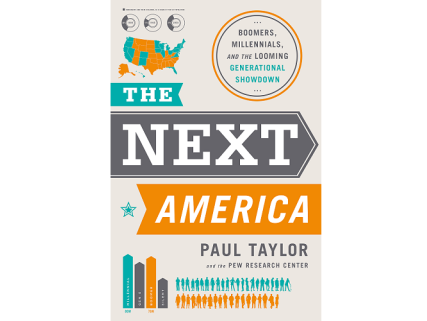Next America 13: Social Security Is Okay?

This post is part of an ongoing series summarizing and reflecting on The Next America: Boomers, Millennials, and the Looming Generational Showdown from the perspective of an Episcopal priest.
Section Summary
Chapter 13 (the last chapter!) of The Next America: Boomers, Millennials, and the Looming Generational Showdown is titled “The Reckoning,” and focuses on the sustainability (and lack thereof) of the Social Security program and other government benefits.
A few disclosures are in order here:
- I am writing this post because I am committed to completing the book, not because I have any expertise in this area. This is a church blog, not a public policy blog.
- The book takes an alarmist tone about the sustainability of Social Security that isn’t borne out by my admittedly scanty independent research. More information is in the Reflections section.
Now that those warnings are out of the way, here’s the chapter summary:
How do Social Security and similar programs impact different generations?
- Different generations will receive different benefits from Social Security.
- The Silents will receive more on average than they have contributed through the payroll tax, and so will most Boomers. Unless the system changes, Generation X and the Millennials will contribute more through payroll tax than they receive in benefits.
- The young are paying taxes to support a level of benefits to the old that they will not receive when they are old themselves.
- As a rising share of government spending funds a social safety net for the old, less is available for other priorities, including those that could improve the economic prospects of the young.
What do you mean, rising share of government spending?
- Social Security and Medicare are on track to consume 50% of all non-interest government spending, up from 28% in 1980.
- When Social Security started, the ratio of workers to retirees was 42 to 1. It is currently less than 3 to 1 and expected to drop below 2 to 1 by 2035. Taxes have been raised to compensate for this shift, but not enough to solve the problem.
- “Fifty years ago, the government spent $3 on public investments that spur economic activity for every $1 it spent on entitlements… [W]ithin a decade the government will be putting $5 into entitlements for every $1 that goes to roads, education, scientific research, and the like.” (p. 188)
How solvent are these programs?
- According to Social Security’s trustees, the Medicare trust fund will be empty by 2026 and the main Social Security trust will be insolvent by 2033. (Note: this sounds terrible, but the author doesn’t mention that tax revenue for these programs will continue.)
That sounds bad. How come we haven’t changed it yet?
- Social Security was designed to be a contributory payroll tax system partly for political reasons; Roosevelt surmised that no politician could kill a program people felt they had paid for themselves.
But do people pay for Social Security with their own contributions?
- Not really. Although Social Security appears to be a system in which you get out what you pay in, Social Security is actually a complex pay-as-you-go system. The upshot is that current workers are taxed to provide benefits to current retirees.
- As well, Social Security is designed with social goals in mind. “It redistributes wealth in a measured way from young to old, from rich to poor, from the healthy to the infirm, and from everyone to the long-lived.” (p. 185)
How do these programs benefit America?
- Social Security, Medicaid and Medicare have been wildly successful in solving the problems they were created to solve.
- Without Social Security, more than twenty million people would be poor. One-third are children, dependents, and the disabled, who receive benefits through the program.
- Without Social Security, nearly half of America’s seniors would be living in poverty; with it, only about 1 in 10 seniors are poor.
- If you care about a senior citizen – and most of us do – your quality of life is improved by these programs as well.
So why do they need to be changed?
- The principle of generational equity, which teaches that “no generation has a moral right to bind successor generations with debt,” demands reform to Social Security and Medicare.
- The US ranked worst in a 2013 cross-national study of 29 advanced countries in terms of imposing unfair burdens on future generations.
- The driving question for public policymakers is how to honor our commitments to the old without bankrupting the young and starving the future.
And how do we change them to make them sustainable?
- The principle of generational equity would indicate that each generation should pay its own way.
- This concept used to please only small-government conservatives, but now the groups that would stand to benefit the most from this shift are the young and minorities. Perhaps these two constituencies could propose a way forward together.
- By framing the issues with Social Security and Medicare in terms of generational equity, thought leaders can help the public understand why the current program is unsustainable.
- Ultimately, the only way to put these programs on a sounder footing will be through political leadership.
Churchwork Reflections
Reading this chapter made me remember a day in my early teens when I was pulled out from school for some sort of leadership development program. The adults running the program counseled all of us kids (who were not yet old enough to work legally), that as soon as we could, we should set up IRAs, because Social Security wasn’t going to exist when we needed it.
I can’t believe I still remember this, but I clearly recall one girl in a red shirt being held up as an example because at age 13 she had an IRA already. (Seriously!? She did not have an IRA because of her own stellar planning: her parents got one for her. I now realize there was no need for me to feel inadequate in that moment – but that’s how I felt, ashamed of myself because I didn’t have an IRA in my early teens. Yes, I’m shaking my head.)
Doing my research for this post made me realize those adults were being alarmist – and so, to a certain degree, is the author of The Next America. Yes, unless there is reform, there will not be enough funds to cover the current level of benefits indefinitely. However, at the point that the savings in the program is exhausted, there will still be enough revenue from current taxpayers to cover benefits at approximately 75% of the current level. Here’s the most important quote:
The Social Security Board of Trustees project that changes equivalent to an immediate reduction in benefits of about 13 percent, or an immediate increase in the combined payroll tax rate from 12.4 percent to 14.4 percent, or some combination of these changes, would be sufficient to allow full payment of the scheduled benefits for the next 75 years.”
I guess I’m wondering why anyone thinks “the sky is falling” on Social Security. There are real problems in American life that can’t be fixed as simply as this. A reduction in benefits doesn’t strike me as a calamity, even if it does mean I pay more in taxes than I receive.
Taking a 25% hit in benefits is definitely less of a sacrifice than any veteran has made for our country.
From Reflection to Action
This was the last chapter! And so the Next America series ends – not with a bang but a whimper.
This series started when I saw advance promotion for The Next America: Boomers, Millennials, and the Looming Generational Showdown and before it was published (and got a lot of 4-star reviews on Amazon). If I do a book series again, I’ll probably find a more highly-regarded book.
However, I have no regrets. I wrote this series because I wanted to learn more about America’s future and the future of the church. Despite some occasional weak chapters, I am really glad to have read the book and written the series. It has been a learning experience for me and hopefully for anyone who has read along. Without it I would not have thought ahead about the church’s finances, researched the church’s ethnic ministries, nor would I have poked into our spending across generations. I’m glad to have had those experiences.
I’m packing these days for our upcoming move, so new writing is going to be scant around here for a while. In poking around my old blog I discovered some posts that I never transferred, so I’ll be republishing them here in the next few weeks. New writing is in the works, as well as some blog shifts and exciting new projects. But first… packing, moving, ramping up for the coming school year.
Thanks for sticking with the Next America series (and particularly this rather desultory post on the disappointing last chapter)!
Am I missing something in the Social Security conversation? Help me out here!





Member discussion